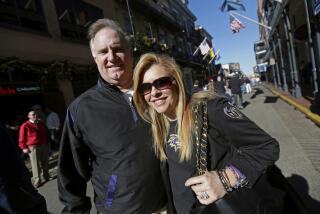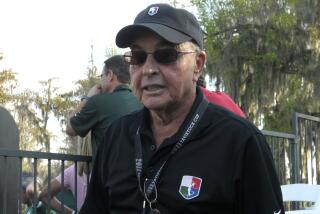Masterminded Beatrice Buyout : Reginald Lewis: Savvy, Low-Key Deal Maker
- Share via
The mention of Wall Street’s recent mania for food companies brings a knowing smile from Reginald F. Lewis, chairman of the New York investment firm TLC Group.
It was, after all, Lewis who in August, 1987, agreed to buy the international foods division of the Beatrice Cos. and in one complicated $985-million deal, catapulted from a little-known Baltimore lawyer and aspiring venture capitalist to what one newspaper called “the most influential black businessman in America.”
Even in this new era of giant deals, the Beatrice transaction ranks as one of the biggest leveraged buyouts of an overseas operation. Beatrice International’s 64 subsidiaries and 20,000 employees span 31 countries. The company had 1987 sales of $2.8 billion and net income of $150 million.
Yet Lewis, 45, is reluctant to tout TLC’s acquisition of Beatrice International Food as the precursor of the recent round of multibillion-dollar offers for the likes of RJR Nabisco, Kraft, Pillsbury and Kroger companies. But, he says, in the wake of his purchase and similar transactions involving European food concerns in the last few years, it was inevitable that investors would become more interested in U.S. food companies.
“The food sector has been undervalued for some time,” Lewis said. “People recognize that companies with established brands are in a unique position. The fact is, the ability to go out and create those brands would be far more costly than acquiring those brands from an existing company. What’s going on now is just extraordinary . . . . But I think in the end we (TLC) were just a part of a much broader process.”
Lewis’ biggest deal before Beatrice International had been for McCall Pattern Co., which he bought with just $1 million in cash and a $24-million loan in 1984. He sold the company last year for $95 million. Within a month, he was on the prowl for Beatrice International, which had 1986 revenue of $2.5 billion.
“The McCall deal really laid the groundwork for our next transaction because it gave us credibility in the marketplace,” Lewis said.
Lewis’ private jet and fondness for cigars embellish his big league, deal-making persona. Low-key and extremely guarded, Lewis seems to want to project himself through deeds rather than words. And friends and colleagues say Lewis is a strong-minded man who pursues his goals with determination and confidence.
“He’s the consummate deal maker; the word ‘no’ is not in his vocabulary,” said Jo Ann Price, president of the National Assn. of Investment Companies, a Washington-based trade group that represents minority venture capitalists. “Despite his training, he’s never been a lawyer’s lawyer in the traditional sense.” Rather, Price said, “I think he’s always enjoyed the process of negotiating and closing the deal.”
Lewis’ deal-making skills were honed while growing up in a large household in a black working-class section of Baltimore. Aside from living with his grandparents for a few years, home was with his mother (a postal worker), his stepfather (a teacher), his three half-brothers and his two half-sisters.
Race Not a Factor
At age nine, he acquired a paper route. He avidly played sports as a teen-ager and initially had thoughts of playing professional ball. But unlike his half-brother and current law partner, former Dallas Cowboys football player Jean S. Fugett, it didn’t work out that way. Instead, he went on to graduate from Virginia State University and Harvard Law School.
Lewis declined to talk about how growing up in a racially segregated community affected him or to discuss his experience as a successful black businessman dealing in the mostly white arena of corporate takeovers and finance.
“It’s understandable that (my race) is something people focus on,” said Lewis. “But what I focus on and what others focus on are two different things. I focus on doing a first-rate job on a consistent basis . . . . I would say my race hasn’t been a factor one way or the other.”
“Reggie sees himself as a deal maker and financier who happens to be black,” added Divakar Kamath, a vice president at the Equitable Life Insurance Co. venture capital subsidiary Equico, which provided some of the financing for Lewis’ acquisition of McCall Pattern.
Lewis won’t say what goals he has in mind for the future. Earlier this year, he indicated that the management of Beatrice’s remaining operations would be the focus of his energies for the foreseeable future. But now he’s sounding a different tune.
“We don’t prejudge the situation,” Lewis said. “We don’t look so far ahead that we limit our flexibility. We keep our options open.”
More to Read
Inside the business of entertainment
The Wide Shot brings you news, analysis and insights on everything from streaming wars to production — and what it all means for the future.
You may occasionally receive promotional content from the Los Angeles Times.










